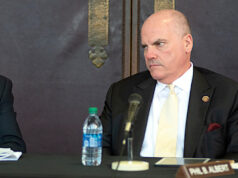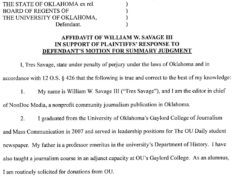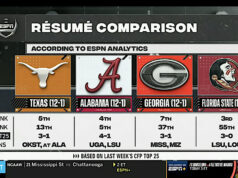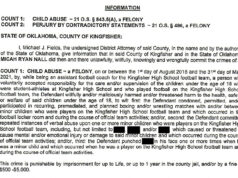

It was a busy week and weekend as far as news and sports were concerned. (And we’re not even talking about how both the OSU Cowboys and OU Sooners won on Saturday.)
Here’s a roundup to start your Monday.
Tiger loses to Floyd in Muscogee (Creek) election
NonDoc wrote Friday about the Muscogee (Creek) Nation’s controversy-filled election. The nation will have a new principal chief after 4,957 citizens voted either absentee by mail or in person Saturday.
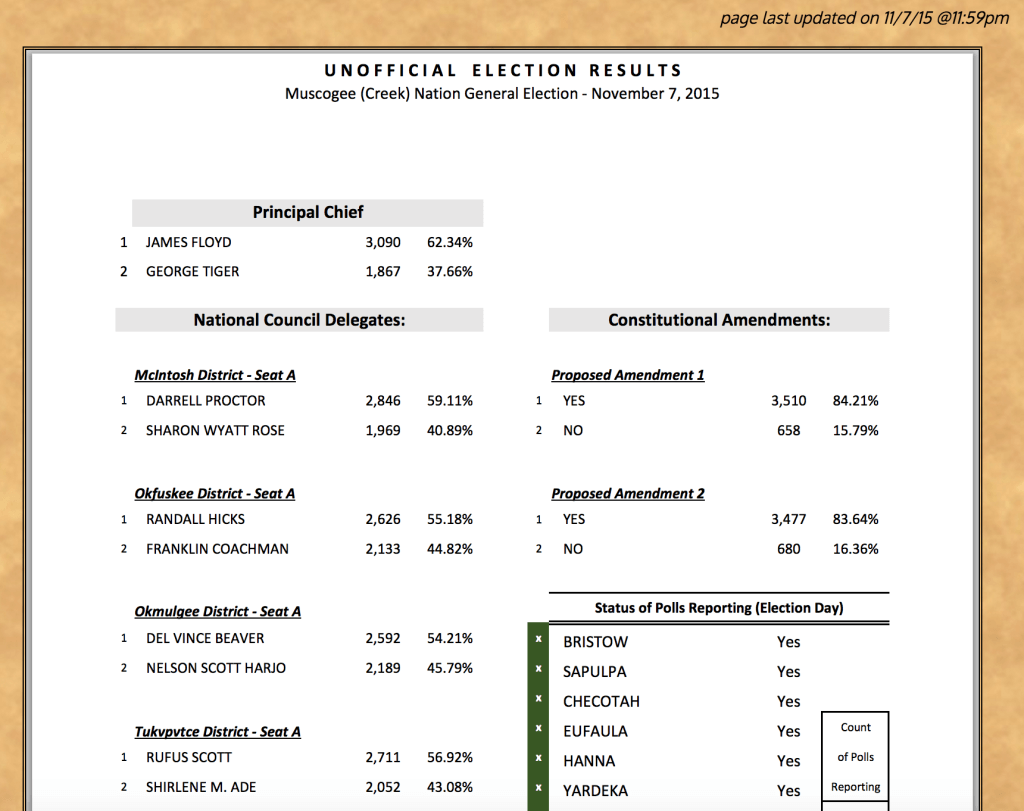
Former hospital administrator James Floyd will become the tribe’s new principal chief, ousting George Tiger whose tenure was marked by scandals and concern over electoral impropriety.
In a separate development for the tribe, the Oct. 15 edition of the Muscogee Nation News reported on Page 6 that the tribal council recently passed legislation that makes the tribe’s media entity “an independent statutory executive agency” with a three-person editorial board. The move takes the newspaper out from under direct executive governance, which would appear to be a victory for journalistic independence.
Missouri students, football players protesting racism
(UPDATE: University of Missouri President Tim Wolfe resigned Monday morning as a result of the boycott, protests and criticisms discussed below.)
An ongoing campus protest about racism at the University of Missouri now includes a boycott by more than 30 black members of the school’s football team.
The players are demanding university president Tim Wolfe resign, a request originally made by the campus protest group “Concerned Student 1950” in this list of demands issued Oct. 20. First on that list is a demand for Wolfe to write an apology and deliver a press conference acknowledging his “white male privilege.” (Second, after Wolfe’s press conference, the group demands he resign.)
Wolfe issued a statement Sunday saying he would not resign and pointed to a “diversity” plan already scheduled for implementation in April 2016. This Sports Illustrated article sums up racial incidents that protestors say Wolfe has failed to address adequately on campus this year:
In September, an African-American student said he was racially abused while walking, and the university did not address the incident for nearly a week.
In October, a student yelled the N-word at members of the Legion of Black Collegians. Later that month, someone smeared feces in the shape of a swastika on a bathroom wall.
Wolfe’s handling of the incidents drew protests from students. Jonathan Butler, a grad student, started a hunger strike Monday, calling for Wolfe to leave his job.
In addition, a homecoming protest by the organization agitated onlookers and demonstrators, at least one of whom was bumped while blockading the car in which Wolfe was riding.
Wolfe’s handling of the ongoing issues seems in stark contrast to how OU President David Boren reacted to a racist fraternity chant in March.
The Mizzou president appears unable to define the term “systematic oppression” in this video posted to Twitter, and his ultimate answer to the question only aggravated his detractors further:
Oh really @UMPrez this is what you think Systematic oppression is?!? @umcurators @CNN @Oprah pic.twitter.com/eSuOqPfT2b
— QianaJade (@Qiana_Jade) November 7, 2015
This Kansas City Star article provides a thorough examination of the situation.
Fallin team pushes back on spine surgeon story
Gov. Mary Fallin had a rough week in the press. Numerous headlines implied she and/or her staff and then-Texas Gov. Rick Perry acted improperly on behalf of a Tulsa spine surgeon who was being investigated by the Oklahoma Board of Medical Licensure.
The original story, written by Tulsa Frontier editor in chief Ziva Branstetter and Brandi Grissom of the Dallas Morning News, detailed how the board’s investigation of Steven Anagnost came to an end.
When Fallin’s general counsel, Steve Mullins, met with key staff members of the Oklahoma Board of Medical Licensure and Supervision in March 2013, Perry’s intervention was part of the discussion.
“He [Mullins] told us that he wasn’t here to interfere with the work of the board but Governor Fallin didn’t want any more calls from Rick Perry about this, that Governor Perry said it was a travesty, and what would it take to make it go away,” Dr. Eric Frische, the medical board’s executive director, later wrote in a memo.
The Anagnost investigation, however, was extremely complex and had drawn on for three years, costing about $900,000. The Oklahoman’s Jaclyn Cosgrove had covered it extensively, including the hearing at which a settlement was reached:
After about 45 minutes in executive session, board members voted 4-3 Thursday to reach an agreement with Anagnost. Through the agreement, known as a voluntary submittal to jurisdiction, Anagnost was allowed to keep his medical license by agreeing to complete a spine fellowship at an accredited facility before reopening his surgical practice. He also agreed to pay a $10,000 fine.
The medical board released an email statement from Executive Director Lyle Kelsey.
“Allegations like these are very serious and will always be vetted and investigated fully. We are committed to our mission to serve, inform and empower Oklahomans through information and promotion of high standards in medical care,” Kelsey said. “While the outcome of this particular case is not ideal, considering all factors, the Board believes their mission to protect and serve the public was fully upheld with the settlement reached, which includes a monetary fine and costs, and requires Dr. Anagnost to successfully complete a nationally recognized spine fellowship program.”
The medical board holds meetings for disciplinary hearings with doctors about seven times a year.
Fallin’s office pushed back against the implication that she or Mullins acted improperly, sending media an unsolicited 1,200-word statement on Friday detailing the history of the Anagnost case.
“We feel that reports on Dr. Anagnost’s case and the office of the governor’s limited involvement in it do not paint a full picture of either the doctor’s dispute with the Medical Licensure Board or the Fallin Administration’s communications with the Board,” the governor’s communications director, Alex Weintz, said.
Weintz’s email on the subject included attachment of two Oklahoma Supreme Court dissenting opinions on Anagnost’s 5-4 failed appeal to the court. In summary, Weintz’s email says the following, emphasis his:
It is not unethical or a violation of ethics policies for the governor to communicate what she considers good policy to executive branch boards. It is, in fact, good executive leadership.
In this case, the state’s Supreme Court had raised significant due process concerns regarding Anagnost’s ongoing investigation. Believing those concerns to be valid, Gov. Fallin’s legal counsel urged the Board to do their jobs and to take some kind of action: either by sanctioning Anagnost or by ending their investigation. Not only is that not a violation of any ethics rules or policies, but we consider that to be the correct decision that has helped to extricate the state from what had become a legal quagmire.
In his dissenting opinion on Anagnost’s challenge, Supreme Court Justice Joseph M. Watt wrote, “I have grave concerns that the petitioner has failed to receive even the minimal due process required under our state and federal constitutions.”
Justice Yvonne Kauger’s dissenting opinion was more lengthy and can be seen here:
 Loading...
Loading...
Oklahoma’s Democratic Party used the story as a reason to hold a press conference demanding investigation of the matter.
Former Democratic leader will be re-sentenced
Meanwhile, former state senator Mike Morgan (D-Stillwater) learned last week that he will be re-sentenced in his conviction for accepting bribes.
Mike Morgan, the former Senate president pro tem, was sentenced in January 2013 to five years on probation. A federal appeals court panel on Friday ordered his trial judge to resentence him, calling probation for his crime intolerable and “little more than a slap on the wrist.”
The three-judge panel of the 10th U.S. Circuit Court of Appeals in Denver also upheld Morgan’s conviction. Two of the judges agreed his conduct “demands a significant period of incarceration.”
The long-awaited decision was a major victory for federal prosecutors.
“As I have said since the day this case was charged, the sale of political influence by an elected official is simply not acceptable and corruption betrays the public trust,” Oklahoma City U.S. Attorney Sanford C. Coats said. “We look forward to the resentencing of this case.”
Morgan had originally been sentenced to five years probation, 104 hours of community service and a $100 fine, in addition to remitting the $12,000 he took in bribes.
NFL receives more bad press
The National Football League also had a bad week of publicity, with photos finally surfacing of the physical harm Dallas Cowboys defensive end Greg Hardy did to his then-girlfriend in 2014 while playing for the Carolina Panthers. (Warning: The photos are graphic.)
Hardy initially avoided suspension for his actions, but public outcry over a video showing Baltimore Ravens running back Ray Rice knock out his then-girlfriend eventually put Hardy back in the spotlight. Hardy has returned to the field this year, and the league’s collective-bargaining agreement reportedly does not allow for another suspension on the same topic.
In addition, the NFL faced another load of unflattering coverage fall on it last week, with this report on teams who were paid by the U.S. military to make patriotic ovations at games or during broadcasts:
For the past several months, we have continued to work with DOD to fully understand the nature and extent of these contracts. In all, the military services reported $53 million in spending on marketing and advertising contracts with sports teams between 2012 and 2015.
More than $10 million of that total was paid to teams in the National Football League (NFL),Major League Baseball (MLB), National Basketball Association (NBA), National Hockey League (NHL), and Major League Soccer (MLS). Over the course of the effort, we discovered the startling fact that DOD cannot accurately account for how many contracts it has awarded or how much has been spent; its official response to our request only accounted for 62 percent of its 122 contracts with the major league teams that we were able to uncover and 70 percent of the more than $10 million it actually spent on these contracts. And, although DOD has indicated the purpose of these contracts is to support recruiting, the Department doesn’t uniformly measure how and whether the activities under contract are actually contributing to recruiting.
The report was created by Sen. John McCain and Sen. Jeff Flake, both Republicans from Arizona.
Stories like these continue to raise questions about whether the NFL — which has $9.5 billion in annual revenue but does not pay federal taxes — should continue to be a 501(c)(6) nonprofit.










